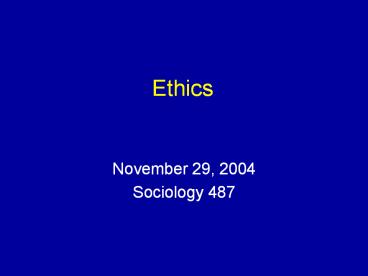Ethics PowerPoint PPT Presentation
1 / 15
Title: Ethics
1
Ethics
- November 29, 2004
- Sociology 487
2
Lecture Topics
- Ethical guidelines for conducting research
- Protection of human subjects
- Ethical guidelines for reporting research
- Tension between ethical issues and scientific
principles and objectives
3
What Determines Whether Research is Ethical?
- Consensus among members of group about right
wrong - Professional Codes of Ethics
- Human Subjects Review Committees / Institutional
Review Boards (IRBs)
4
Guidelines for Ethical Research
- Cause no harm to respondents
- Secure voluntary participation
- Maintain anonymity or confidentiality
- Disclose identity except in exceptional cases
5
Cause no Harm
- Are the risks essential to the research?
- Minimize physical and psychological risks
- Respondents must be fully informed about
potential risks - This may compromise research objectives
6
Case Study Milgram Experiment
- 1965 classic study of obedience to authority
- Volunteers were recruited for a study of the
learning process. - Volunteers were told by experimenter to play the
role of teacher and administer electric shocks
to student in next room when the student failed
a memory test - Shocks were phony students were confederates
of experimenter - But, volunteers didnt know this and many obeyed
authority - 65 of teachers administered shocks up to
maximum 450 volts - Volunteers were very uncomfortable but were
they harmed? - Did the means justify the ends?
7
Anonymity and Confidentiality
- Key issue is protection of respondents identity
- Anonymity
- No one can identify respondent
- Assuring anonymity conflicts with follow-up
efforts - Confidentiality
- Researcher can identify respondent but promises
not to do so publicly - Respondents may waive right to anonymity and
confidentiality
8
Role of IRBs
- Major obligation is to protect human subjects
from unnecessary risk and minimize necessary risk - Some social science research exempt from IRB
review - Analysis of secondary data
- Research in educational settings about
instructional strategies techniques
9
Voluntary Participation
- Informed Consent
- based on full understanding of risks of research
- What about Children?
- Prisoners?
- Mentally impaired?
- Students?
- Tension with scientific concerns
- Generalizability may be compromised
10
Ways to Protect Confidentiality
- Appropriate training of everyone involved in
research - Remove identifying information from research
materials - Destroy identifying information after follow-up
- Replace name with respondent IDs on data files
- May not sufficiently protect confidentiality
11
Honesty
- Researcher should
- Reveal identity
- Reveal purpose of study
- But, sometimes deception essential to research
- Experiments
- Observational studies
- Debriefing is partial solution to ethical issues
12
Case Study Tearoom Trade
- Laud, a graduate student is interested in people
who engage in occasional public homosexual acts.
In his observations as a watch queen, he
notices that the men he observes in a tearoom
(public restroom) seem to be normal in many
ways and he wants to learn more about who they
are. He fears that the men would not want to be
interviewed, so he writes down the license plate
numbers of those participating, and through
police connections, finds out the mens
identities. Laud goes to their homes, and
collects personal information from the men under
the pretenses that he is conducting a health
survey. Many interesting findings result.
13
Analysis and Reporting
- Ethical responsibilities to scientific community
- Report shortcomings of research
- Report negative findings
- Report unexpected findings as serendipitous
discoveries - Dont make up hypotheses after analyzing the data
discovering findings - Avoid lying with statistics
14
Ethics Politics
- Ethics concerns methods of research
- Politics concerned with use of research
- Can researcher set aside own values?
- Objectivity of research
- Scientific results can be used in ways researcher
opposes
15
Key Points
- Ethical research
- Causes no harm to subjects
- Obtains voluntary consent from subjects
- Reveals identity and objectives of researcher
- Ethical guidelines sometimes in conflict with
research objectives - Ethical issues are sometimes not obvious
- Ethics also includes reporting research fully and
honestly

